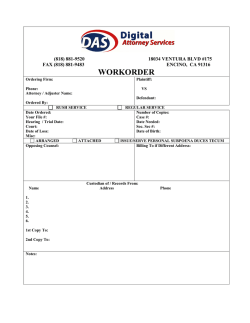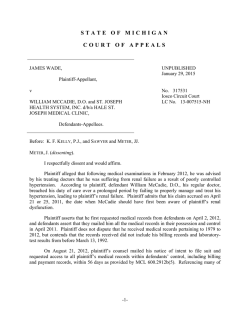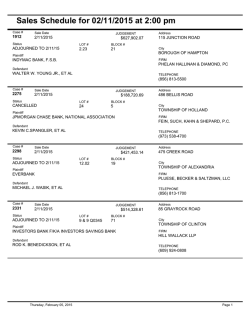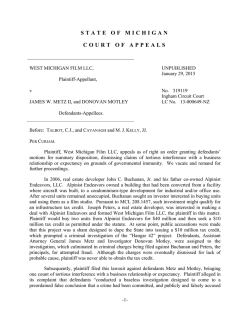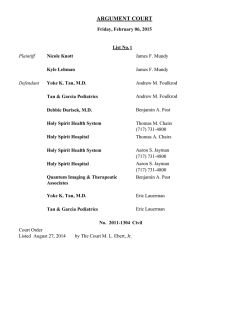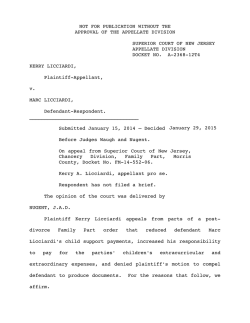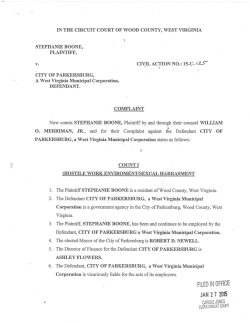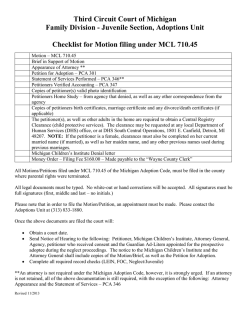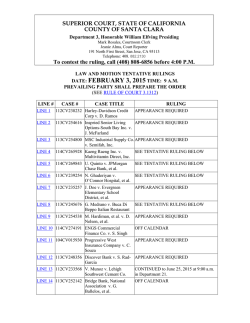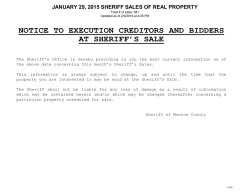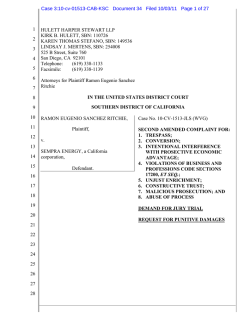
Unpublished 01/28/2015
STATE OF MICHIGAN COURT OF APPEALS JACQUELINE HARRIS, UNPUBLISHED January 29, 2015 Plaintiff-Appellee, v No. 317749 Macomb Circuit Court LC No. 2013-001950-NO CLINTON TOWNSHIP HOUSING COMMISSION, Defendant-Appellant. Before: MURRAY, P.J., and SAAD and K. F. KELLY, JJ. PER CURIAM. Defendant appeals the trial court’s denial of its motion for summary disposition under MCR 2.116(C)(7). For the reasons stated below, we reverse and remand for entry of an order of summary disposition in favor of defendant. I. FACTS AND PROCEDURAL HISTORY Plaintiff is a resident of a housing project operated by defendant Clinton Township Housing Commission (“the Commission”). On June 1, 2011, she tripped and fell on an elevated walkway at the housing complex that was covered in debris, and injured herself in the process. She sued the Commission in May 2013 for premises liability, and alleged that defendant failed to maintain the walkway in a reasonably safe condition. She also claimed that the condition of the walkway constituted a public nuisance. The Commission moved for summary disposition under MCR 2.116(C)(7). It stated that it was a governmental entity and operated the housing project pursuant to MCL 125.653. Accordingly, the Commission argued, it was immune from tort suit under the Governmental Tort Liability Act (“GTLA”), MCL 691.1401 et seq., unless plaintiff could demonstrate that her tort claims fell within one of the GTLA’s enumerated exceptions. The Commission stressed that the specific GTLA exception under which it might be possible for plaintiff to substantiate a claim, MCL 691.1402 (the highway exception), is subject to a notice requirement under MCL 691.1404(1). Among other things, MCL 691.1404(1) requires that a plaintiff provide a governmental defendant with a notice of injury and defect within 120 days of his injury, and that the notice must specify the exact location and nature of the defect. Because plaintiff failed to provide the commission with a notice that complied with MCL 691.1404(1), the Commission -1- argued that it was impossible for her to bring a claim under MCL 691.1402, or any other section of the GTLA. In response, plaintiff asserted that she complied with MCL 691.1404(1) by providing the Commission with written notice of her injury within 120 days of her injury. She could not produce a copy of the notice that she supposedly gave to the Commission. Instead, plaintiff and her daughter made affidavits,1 which stated that: (1) plaintiff provided a written notice to the Commission soon after her injury; and (2) the notice described the location of the sidewalk where she was injured and the nature of the sidewalk defect. The trial court held that plaintiff’s affidavits created a question of fact as to whether plaintiff gave notice of her injury in compliance with MCL 691.1404(1), and accordingly denied defendant’s motion for summary disposition. It did not address plaintiff’s nuisance claim. On appeal, the Commission makes the same argument as it did in the trial court: namely, that plaintiff cannot maintain her premises liability action under MCL 691.1402, because she did not comply with the notice requirement of MCL 691.1404(1).2 Plaintiff asks us to uphold the ruling of the trial court that her affidavits create a question of fact as to whether she gave notice to the Commission in compliance with the statute. II. STANDARD OF REVIEW A trial court’s decision on a motion for summary disposition under MCR 2.116(C)(7) is reviewed de novo. Roby v City of Mount Clemens, 274 Mich App 26, 28; 731 NW2d 494 (2006). “When reviewing a motion for summary disposition under MCR 2.116(C)(7), all wellpleaded allegations must be accepted as true and construed in favor of the nonmoving party, unless contradicted by any affidavits, depositions, admissions, or other documentary evidence submitted by the parties.” Pierce v City of Lansing, 265 Mich App 174, 177; 694 NW2d 65 (2005). III. ANALYSIS The GTLA states that “governmental agencies” are “immune from tort liability if the governmental agency is engaged in the exercise or discharge of a governmental function.” MCL 1 The trial court stated at the motion hearing that it hadn’t received copies of plaintiff’s affidavits, and had to review plaintiff’s own copies of the affidavit at the hearing. 2 In her brief on appeal, plaintiff, after stating that she does not dispute the Commission’s (accurate) argument that the GTLA bars common law trespass-nuisance claims against governmental entities, withdraws her claim for trespass-nuisance. See Pohutski v Allen Park, 465 Mich 675, 690; 641 NW2d 219 (2002). As noted, the trial court did not address this issue at the motion hearing. Accordingly, we grant defendant’s request for summary disposition under MCR 2.116(C)(7) as to plaintiff’s trespass-nuisance claim. -2- 691.1407(1).3 Other provisions of the GTLA enumerate specific exceptions to this general grant of governmental immunity from tort claims, including for persons “who sustain[] bodily injury . . . by reason of failure of a governmental agency to keep a highway under its jurisdiction in reasonable repair and in a condition reasonably safe and fit for travel.” MCL 691.1402(1). MCL 691.1401(c) defines “highway” to mean: a public highway, road, or street that is open for public travel. Highway includes a bridge, sidewalk, trailway, crosswalk, or culvert on the highway. Highway does not include an alley, tree, or utility pole. However, this “highway exception” to the GTLA is limited by another provision, MCL 691.1404(1), which mandates that any plaintiff who brings an action under MCL 691.1402(1) must, “within 120 days from the time the injury occurred”: serve a notice on the governmental agency of the occurrence of the injury and the defect. The notice shall specify the exact location and nature of the defect, the injury sustained and the names of the witnesses known at the time by the claimant. [MCL 691.1404(1).] “Failure to provide adequate notice under [MCL 691.1404(1)] is fatal to a plaintiff’s claim against a government agency.” McLean v Dearborn, 302 Mich App 68, 74; 836 NW2d 916 (2013). “Although under some circumstances this Court will conclude that a notice is sufficient despite a technical defect . . . the plaintiff must at least adequately provide the required information.” Id. at 75, citing Plunkett v Dep’t of Transp, 286 Mich App 168, 176–177; 779 NW2d 263 (2009). Here, the Commission is a governmental agency engaged in the discharge of a governmental function pursuant to MCL 125.653—the operation of a housing project for poor residents of Clinton Township.4 Accordingly, the Commission is immune from tort suit unless plaintiff can demonstrate that her claim falls into one of the GTLA’s enumerated exceptions. Plaintiff’s claim, that she injured herself after tripping on a defective sidewalk, falls within the highway exception to the GTLA, MCL 691.1402(1). But plaintiff did not comply with the notice requirement that is necessary to sustain a complaint under that section. MCL 3 A governmental function is “an activity that is expressly or impliedly mandated or authorized by constitution, statute, local charter or ordinance, or other law.” MCL 691.1401(b). “The term ‘governmental function’ is to be broadly construed.” Maskery v Bd of Regents of Univ of Mich, 468 Mich 609, 614; 664 NW2d 165 (2003). 4 MCL 125.653 permits “any city, village, township or county” to create a commission to “accomplish the purposes set forth in [MCL 125.652].” In turn, MCL 125.652 permits “[a]ny city, village, township or county of the state of Michigan [to] purchase, acquire, construct, maintain, operate, improve, extend or repair housing facilities and eliminate housing conditions which are detrimental to the public peace, health, safety, morals or welfare.” -3- 691.1404(1). Again, the notice requirement had to be submitted to the Commission within 120 days of plaintiff’s injury, and include “the exact location and nature of the defect” that caused her injury. At every step in this litigation, plaintiff has failed to produce a copy of the notice she allegedly provided to the Commission. In lieu of a copy of the actual notice, plaintiff and her daughter submitted affidavits. The affidavits asserted that plaintiff’s daughter submitted a written notice to the Commission, and that the notice included plaintiff’s “name, the date that [plaintiff] fell and indicated the location where [plaintiff] fell at and described the defect.” The daughter’s affidavit also claimed that the written statement included “the specific location of the injury” and “described the nature of the defect.” However, neither affidavit contained specific details describing the location of the injury or the nature of the defect. Accordingly, plaintiff’s attempt to use her affidavits to satisfy MCL 691.1404(1)’s notice requirement is unavailing. As defendant observes, plaintiff’s affidavits are factually deficient, because they fail to state sufficient facts to allow a court to determine whether the notice included the required information: the “exact location and nature of the defect.” Even at this late date, plaintiff has failed to provide this information. Plaintiff and her daughter’s assertions that the supposed notice contained this information are thus mere conclusions, and conclusory allegations are insufficient to establish a question of fact. Quinto v Cross and Peters Co, 451 Mich 358, 371-372; 547 NW2d 314 (1996). We reject plaintiff’s argument that if her affidavits are deemed insufficient, defendant is not entitled to summary disposition because it failed to submit an affidavit or other factual support for its contention that it did not receive the requisite notice. As noted, plaintiff’s complaint and affidavits failed to meet the basic notice requirements of MCL 691.1404(1). Accordingly, her claim, as a matter of law, failed to allege any facts that abrogated governmental immunity—because plaintiff did not comply with MCL 691.1404(1)’s notice requirements, her complaint and affidavits did not allege facts that could abrogate governmental immunity under MCL 691.1402(1). And because governmental immunity is presumed absent the existence of facts that fall under the GTLA’s enumerated exceptions, and plaintiff submitted nothing to rebut this presumption, defendant did not need to submit an affidavit or other factual support for its contention that it did not receive the requisite notice—plaintiff’s failure to comply with MCL 691.1404(1) was proof enough. Defendant is therefore entitled to summary disposition under MCR 2.116(C)(7). We reverse the holding of the trial court, and remand for entry of an order granting summary disposition to defendants under MCR 2.116(C)(7). Reversed and remanded. We do not retain jurisdiction. /s/ Christopher M. Murray /s/ Henry William Saad /s/ Kirsten Frank Kelly -4-
© Copyright 2026
